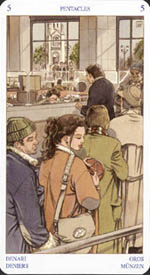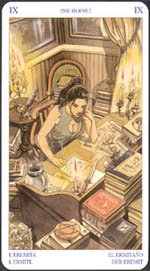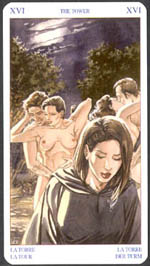|
 The so-called (Neo) Paganism or Wicca, another American new age movement based more or less upon European
Witchcraft as the more juicy British Gardnerian tradition, strikes back to Europe with this deck "Pagan
Tarot", published by Lo Scarabeo (the German title of the deck is "Hexenkult Tarot" , "Hexen" meaning
Witches). The American pagan tradition is a mixture of a back-to-nature and simple living concept, blended
with witchcraft lore and rituals; Americans love rituals, how ever silly they may appear to a modern
European mindset. So this is a tarot deck essentially illustrating simple life and rituals. One may see the
majors as having a through-going story in the images, a young, smart and attractive female (Hermit) - a
writer or business person perhaps - who after searching in the darkness (The Fool), approaches paganism and
is persuaded by the Elders (Justice), ending up as an adept through a ritualistic initiation in the circle
or coven. The four suits can then be read as the various paths her life can or could have taken, like her
religious reflections and the everyday situations our heroine takes part in; for example the "5 Pentacles"
card (I can only see one pentacle though) showing her queuing in the bank.
The so-called (Neo) Paganism or Wicca, another American new age movement based more or less upon European
Witchcraft as the more juicy British Gardnerian tradition, strikes back to Europe with this deck "Pagan
Tarot", published by Lo Scarabeo (the German title of the deck is "Hexenkult Tarot" , "Hexen" meaning
Witches). The American pagan tradition is a mixture of a back-to-nature and simple living concept, blended
with witchcraft lore and rituals; Americans love rituals, how ever silly they may appear to a modern
European mindset. So this is a tarot deck essentially illustrating simple life and rituals. One may see the
majors as having a through-going story in the images, a young, smart and attractive female (Hermit) - a
writer or business person perhaps - who after searching in the darkness (The Fool), approaches paganism and
is persuaded by the Elders (Justice), ending up as an adept through a ritualistic initiation in the circle
or coven. The four suits can then be read as the various paths her life can or could have taken, like her
religious reflections and the everyday situations our heroine takes part in; for example the "5 Pentacles"
card (I can only see one pentacle though) showing her queuing in the bank.

 I can't really see, why the illustrations of an otherwise straightforward and simple story are, so to speak,
presented in loose leaf form. What is the advantage of mixing the single scenes of this story around in
various contexts? The story is much too simple for that, it takes a much more intricate symbolism to make a
tarot deck. Thus the Pagan Tarot is another comic-book concept, that only proves that tarot, which
originated as a tool for personal and magical development, has been turned into a consumers product meant to
be read, looked at and then thrown away after brief use. The few surviving copies will be collector's items
in a far future, like early comic books are today, not so much for their contents but for their rarity.
I can't really see, why the illustrations of an otherwise straightforward and simple story are, so to speak,
presented in loose leaf form. What is the advantage of mixing the single scenes of this story around in
various contexts? The story is much too simple for that, it takes a much more intricate symbolism to make a
tarot deck. Thus the Pagan Tarot is another comic-book concept, that only proves that tarot, which
originated as a tool for personal and magical development, has been turned into a consumers product meant to
be read, looked at and then thrown away after brief use. The few surviving copies will be collector's items
in a far future, like early comic books are today, not so much for their contents but for their rarity.
The concept is by Gina Pace, an American tarotist, who runs a tarot website under the name of "Wicce" and
who likewise adapted the standard booklet text a bit to fit the present deck. The artwork is by Luca
Raimondo and Christiano Spadoni.
|